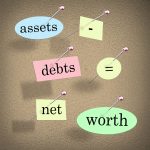Debt puts a strain on your finances and can cut a big chunk out of your monthly budget. Being under the pressures of debt can, at best, put your financial goals behind schedule and, at worst, cripple your ability to provide for yourself. The problem of debt is fairly ubiquitous in this country, with the total combined credit card debt rising to around $900 billion. However, though it may seem impossible to overcome, debt doesn’t have to be an everlasting problem. There are several tactics you can use to eliminate debt.
The Budgeting Method
This one may seem obvious. Balancing your income and expenses is a simple way to try to take down debt but you just don’t have the money. However, it’s an often overlooked way to deal with household finances and a deep look at your accounts may yield some surprising results.
I have a friend who was struggling to eliminate some pesky credit card debt, but he had never really looked at his finances all together. We evaluated his income and expenses and found that he had an extra $50 in his budget each month to put toward his debt!
If you have credit card debt, it’s important to realize that by just making the minimum payment, it may take you years to it pay off completely, even with small debts. Looking at your budget can help you trim the fat. Here are some common ways to make a lean and mean debt, destroying budget:
- Cancel your gym memberships and find a park to work out in or a free outdoor trail (working out in the great outdoors is more fun anyway).
- Learn to make some simple meals and eat out less. Not only can this help you spend less on food every month, it can be a healthier option.
- Cancel unneeded subscriptions. Stop getting papers and magazines that clutter up your house. Step into the 21st century and get your news from the internet.
- Cancel your cable subscription and switch to a video streaming service. Streaming services like Netflix or Hulu tend to be more reasonably priced than cable or dish services. Plus, they don’t often increase their prices for no reason.
- Switch internet or cell service providers. Has your internet or cell phone bill increased over the years? Look at what the other guys charge. Call up your ISP and negotiate for a better deal or promotion. If they don’t deliver, switch!
After you’ve made some simple changes, take the savings and put them towards your credit card bill. One good tactic is to focus on the smallest bill first. Once it’s paid off, take the money you would have paid to it each month and add it to the next bill. By paying off bills you increase the amount you can afford to put toward the next one.
If you’ve gone through your budget and you are still struggling to make payments every month, it might be time to look at some other options.
Personal Loan Consolidation
It may sound counterintuitive at first, to trade one lender charging monthly payments for another. However, personal loans may not carry interest rates as high as you might believe; plus, it is a good unsecured way to combine multiple debts. In many circumstances, loans have lower rates and better terms than a credit card and consolidating multiple debts into one can also lower your monthly obligation.
However, it’s important to find the right personal loan to make consolidation worthwhile. First you need to look for a loan with rates that are better than the ones you are getting with you current loans or credit cards. Credit card rates are typically higher than personal loans and if you have multiple cards, combining it may mean their collective interest is much higher. However, it is important to recognize that consolidated interest rates are often an average of the existing interest rates. That means averaging a few high interest rates with some lower ones may increase the overall rate. In some cases, it may be easier to take care of smaller loans with low rates rather than combining them with larger rates.
It’s also important to watch out for fees that can add cost to the consolidation process. Some lenders charge origination fees for opening an account or early repayment fees for paying back your loan before the term is finished. However, there are plenty of lenders that don’t charge fees like this, so you shouldn’t take them as the standard price of doing business.
Finally, consider the pros and cons of choosing a loan with either fixed or variable APR. A fixed interest rate will be easy to plan your budget around and allows you to see when you can realistically pay the loan off. However, variable rates can fluctuate and are often much lower than fixed rates, though they also have the potential to be high. With a variable rate, it might be harder to accurately budget your repayment.
Personal Loan Refinancing
Refinancing with a personal loan is like consolidation, but it does not necessarily have to include more than one debt. If you have one debt you are struggling to pay off, refinancing it with a personal loan might be a good option. For this to be worthwhile, you need to make sure the terms and payments will change in your favor. If you’ve racked up credit card debt, the interest rates may be increasing your debt faster than you can pay it back. By finding a loan with better terms you can start fresh and stop accruing interest at overwhelming rates.
Again, it’s important to avoid fees and find a rate that is better than the one you already have. It can also be helpful to find a company that offers some attractive terms. For instance, some lenders have safeguards for the event that you lose your job. Others will allow you to reassess your terms during repayment without penalty.
0% Balance Transfer Cards
Using a credit card to pay off credit cards may sound a little unorthodox, but it can work with the right card. A 0% balance transfer card will allow you to transfer your existing debts into one credit card with no fees and will allow a period of no interest. This will give you the benefit of making payments before you start to accrue interest. However, it may end up charging you higher rates than a personal loan would. So it is important to look at your budget to see if you can pay it off during the no interest period.
Final Word of Caution
For refinancing and consolidation with loans or credit cards, there are some drawbacks. Quickly closing lines of credit and opening new ones may have some effect on your credit score, at least in the short term. If you are getting ready for something that may require good credit (like renting an apartment or getting a new job) it might not be the right time to refinance. Also, if you aren’t struggling to make monthly payments, it may not be worth it to refinance, because it might lengthen the time it takes you to repay the loan (which means you pay more in interest overall). In that case, the tried and true budgeting method may be a better fit.









Beware the zero interest promotional checks that come with your credit cards. Some have transfer fees up to 5% of the amount which is basically interest paid up front. Choose wisely. Also, if you use the check, DO NOT put anything else on that card.
Most cards with balance transfers will start charging interest IF you use the card while under the promotional rate. Also, if you do not pay off the balance by the end of the promotional period, you may be paying interest retroactively for the full amount from the day that you used the check.
Great tips! Thanks for pointing out how the fine print can get you in trouble.